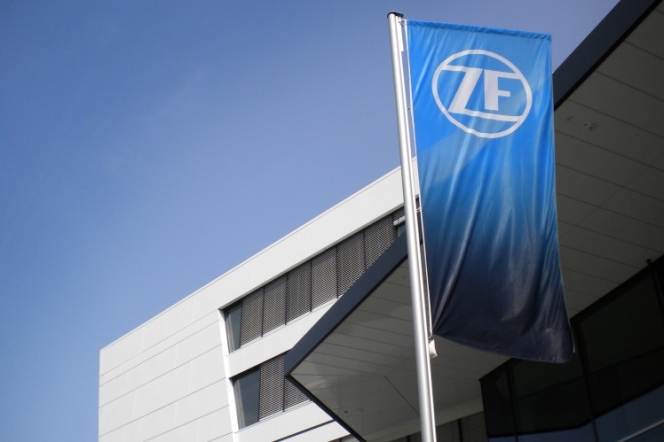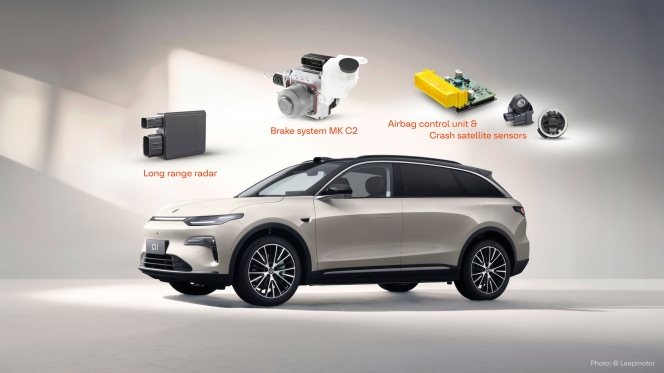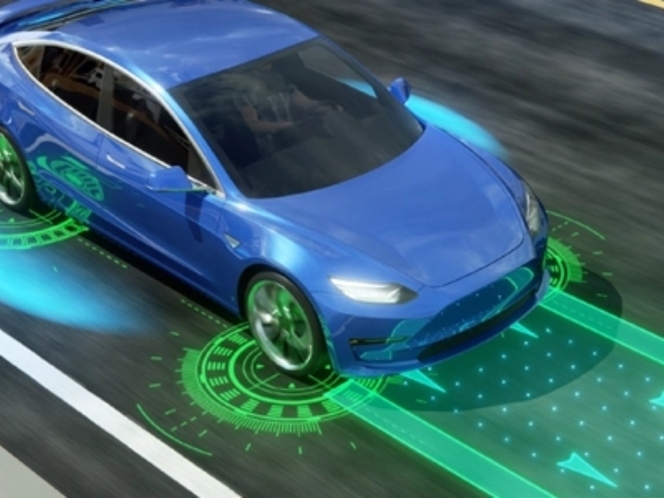Becoming Smarter And Sustainable
- By Juili Eklahare
- September 13, 2022

Bosch has always been known for its cutting-edge technology, including in the mobility sector. The company completed 100 years in India this year and has also come up with a new smart campus called Spark.NXT, which was launched in July this year in Bengaluru, India. Spark.NXT has several parts to it, along with sustainability and mobility being a prominent focus.
Bosch, a leading supplier of technology and services, has been bringing together comprehensive expertise in vehicle technology with hardware, software and services to offer complete mobility solutions. The Bosch mobility solutions web portal presents highlights from the areas of connected mobility, automated mobility and powertrain systems and electrified mobility. In fact, Bosch is present in all of the mobility segments in India – from passenger vehicles to heavy commercial vehicles and light commercial vehicles to three-wheelers and two-wheelers.
Adding another feather to its cap will be one of the latest steps of the company – expanding its artificial intelligence of things (AIoT) activities in India by transforming its headquarters in Adugodi, Bengaluru, into a new smart campus called Spark.NXT. The inauguration of the same took place in Bengaluru, India, in July this year, also with the company celebrating 100 years of Bosch in India.
Throwing light on Bosch completing 100 years on Indian soil, Soumitra Bhattacharya, Managing Director at Bosch Limited and President of the Bosch Group, India, averred, “In terms of automotives, we have moved from an automotive components manufacturer to a systems manufacturer to a solutions manufacturer.”
Over the last five years, Bosch has invested INR 8 billion in developing the campus, which has the capacity to potentially house 10,000 associates. The 76-acre site is Bosch’s first smart campus in India and features multiple smart solutions based on sustainability, security and user experience for associates, visitors and facility management. It is designed to adapt to the needs of the users, and the smart solutions are innovated on the foundation of Bosch’s technological know-how.
In truth, in the construction phase, a strong emphasis was placed on recyclable materials and the transplanting of trees, ensuring an increase in green cover.
As an AIoT company, Bosch India leveraged its world-class artificial intelligence (AI), internet of things (IoT), automation and digitalisation capabilities to develop its smart campus in pursuit of its vision for a sustainable, self-reliant and future-ready India. To further enhance its R&D capabilities for the new way of working, the company has also trained over 10,000 associates through a comprehensive reskilling initiative over the past two years.
Spark.NXT – what is it?
Bhattacharya explained that Spark. NXT is a curiosity to transition and transform, and to meet the business expectations of not only grabbing the opportunities but co-creating the opportunities of the future.
Filiz Albrecht, Member of the Board of Management and Director of Industrial Relations at Robert Bosch GmbH, who officially took responsibility for Bosch India from 1 July 2022, talked about Spark. NXT and asserted, “Spark.NXT demonstrates our commitment to both sustainability and the well-being of our associates. It features a variety of smart IoT and machine learning (ML) solutions, which are expected to cut energy consumption on the campus by nearly 30 percent. The new campus will be an inspiring environment for our associates that will help them unleash their creativity and spark future innovations.”
In his inaugural speech, the Indian Prime Minister, Narendra Modi, said that the Bosch Spark.NXT campus will certainly take the lead in developing futuristic products and solutions for India and the world. “I am happy that Bosch India has worked not only on innovation but also in giving it scale,” he said and added, “A key pillar in this will be sustainability. I was told that Bosch has achieved carbon neutrality both in India and outside of the country, which is very inspiring. Bosch came to India 100 years ago as a German company, and now it is as much Indian as German. This is a great example of German engineering and Indian energy.”
Spark.NXT has been broken into six parts – Spark.Mobility, Spark.Living, Spark.Industry, Spark.Software, Spark.Sustainability and Spark. Culture.
Spark.Mobility
“In mobility, we are talking of green mobility under four core factors – personalised, automated, connected and electrified,” Bhattacharya enlightened and continued, “For the last 12 years, we have worked on safety and reducing road accidents very closely with the Government of India.”
Spark.NXT and collaboration
Bhattacharya further put across that they are trying to do obsessive collaboration, not just with their customers or start-ups but for their group companies. “Many of these legal entities are currently, and will be further, housed inside the campus. We work together with software and hardware engineers, look at what the customers need and co-create the solutions,” he elucidated and continued, “Today, it’s all about where people get together and co-create through collaboration and also create opportunities.”
Giving a concrete example, Bhattacharya said, “Let’s take the example of driver drowsiness in some vehicles. So the emergency brakes, the cockpits, the connectivity and the various aspects that we will further announce in the areas of hydrogen electrification are all simple but clear examples of what we are trying to do.”
“So this campus, with this environment, allows us to get not just internal collaboration but external collaboration as well,” he stated.
Bosch’s sustainable practices
Albrecht further stated that the Bosch Group is a leading global supplier of technology and services. “We have 128 locations across the globe and the company generated a sale of EUR 78.7 billion in 2021,” she shared and went on, “Bosch is a value-driven company and our commitment to sustainability is an integral part of the corporate culture. The key for us is technology, and as an innovation leader, we develop products and solutions of outstanding quality that help conserve natural resources and improve the quality of life.”
Albrecht went on to mention that as a company, Bosch has a long history of sustainable practices. She asserted, “Sustainability is no longer just a ‘nice to have’. Today, sustainability is our core mission, and we are working hard to live up to our responsibility here. By acting in an economically, environmentally and socially responsible manner, we want to improve the quality of life of the present and future generations as well. The Bosch Group has been carbon neutral since 2020.”
Focusing on carbon neutrality
“While making our own operations carbon neutral was in itself a big step, we are now focusing our efforts on reducing emissions outside of our direct sphere of influence,” Albrecht asserted and continued, “We are aiming to reduce our annual upstream and downstream emissions by 15 percent by 2030. To achieve this, we are, firstly, pursuing a circular economy strategy that involves keeping materials and products into usability for as long as possible. Secondly, we are striving to optimise energy efficiency in our existing products. And thirdly, we are shifting our product portfolio towards carbon neutrality.”
Coming to Bosch India, Albrecht cited that it is playing a key role in carbon neutrality, water management and energy efficiency, and that the people at Bosch India are doing some inspiring work in sustainability. While sustainability is central to a company’s corporate strategy, its success depends on the people. Bosch India wants to create an environment that enables its associates to develop their full potential and contribute to the company’s long-term success. It is preparing its associates for the transformation and helping them to develop personally and acquire new skills.
Investment in electromobility, digitalisation and more
“One more area of focus is reskilling associates and preparing them for the technologies of the future,” Albrecht informed and continued, “Over the past five years, Bosch has invested EUR one billion in this and plans to invest another billion in artificial intelligence, electromobility, software, digitalisation and Industry 4.0, to name just a few, over the next five years. Here as well, India is playing a key role for both our company and the global arena. The country has an advantage of demography and the availability of talent that can power global solutions.”
The importance of diversity
She went on to aver that when it comes to their workforce, they are convinced that their tremendous diversity is one of their most important factors of success. As a global player, Bosch has associates from some 150 different countries, and diversity is one of the core values of the company. The company is working hard at all levels of the Bosch Group to increase its diversity further by also bringing in women in leadership roles.
Coming to India, Albrecht said, “India is a highly diverse country, with a variety of cultures and languages. We believe that India’s diversity is key to its engine of innovation, and we’ll continue to invest in our local workforce in the years to come."
Bosch’s presence in Karnataka
Bhattacharya spoke of the company’s presence in Karnataka and mentioned that Bosch has the largest R&D centre in the world (outside of Germany) in Karnataka and that Bosch Global Software Solutions is headquartered in Koramangala. “Our collaboration with the Government of Karnataka has been there for a very long period,” he mentioned.
He further highlighted, “We transitioned the country from BSIV to BSVI in a record time of three years, where Europe and other countries took eight years. We have also worked very closely with the Government of India for Make in India and Aatmanirbhar Bharat.”
The Chief Minister of Karnataka, Basavaraj Bommai, who was the Chief Guest at the ceremony, applauded the work done by Bosch India, especially in Karnataka. He asserted, “It is a pleasure to be part of the inauguration of the Spark. NXT Campus of Bosch India. The company has had its presence in the state for several decades now, and it is heartening to host India’s largest smart campus here. Karnataka, primarily Bengaluru, has been a technology hub and houses the largest number of R&D centres across the globe. This campus is another feather to its cap.”
The chief minister further added, “This campus showcases R&D capabilities for both automotive and non-automotive products and services, and I hope that this will elevate the city’s leadership in the field of technology to a greater level.”
Campus walkthrough
The media was even given a walkthrough of the new smart campus, taking them through three of the solutions – Bosch Air Quality Management, Smart Working Solution and Visitor Management System.
Bosch Air Quality Management – Bosch India has already taken a lot of measures inside the new campus to reduce the impact of air pollution. Some of the measures include increased green cover (by 30 percent) and increased green energy – the company has made its entire campus a non-motorised zone. Plus, it has some new initiatives, like paperless work culture, planned.
However, in order to understand the effect of the emissions surrounding the campus (traffic, construction etc.) on the campus, the company has deployed its air quality monitors inside the campus and regularly monitors the data. This data is provided to the associates and is available as real-time information. The data is also made available to visitors on a big screen in the lobby etc.
Smart Working Solution – With the hybrid working model becoming the new norm, this opens up opportunities to reduce some real estate costs by decreasing the number of desks available. Naturally, it becomes important for the associates to know if there are desks available before they go to the office. Therefore, in order to facilitate this kind of flexible working model, Bosch India has come up with a smart solution, ‘Flexi Booking App’. Through this application, associates can check the availability of the desks and book the same from the comfort of their homes.
Another smart solution that Bosch India has come up with is ‘Automated Comfort Assistant’ application. Through this application, associates can provide feedback on how they feel about the office temperature (too hot, too cold etc.), and the system automatically adjusts the temperature based on this feedback so that everyone feels comfortable.
The combination of these two solutions gives real-time usage for facility management to optimise the workplace. This eventually helps in a considerable reduction in the cost of the real estate.
Visitor Management System – The Smart Visitor Management Solution scans a visitor’s face and gives automatic access. Plus, this solution also has a smart locker that works on a QR-based system – when an employee sends an invite to a visitor, the visitor gets a QR code on their mobile. The visitor just has to show the QR code as smart locker and a locker is assigned to them. There is no manual intervention involved; it's all automated.
The benefit of this solution is that it gives the visitor a seamless experience – there is zero dependency and enhanced security.
In order to make the solution much smarter, the company also wants to implement geo fencing (so that visitors do not go into any areas of the campus where they are not supposed to go), go cardless and include a robot to assist visitors around the campus.
ZF, BMW Sign Long-Term Supply Agreement For Drive Technologies
- By MT Bureau
- February 03, 2026

German tier 1 supplier ZF Friedrichshafen and the BMW Group have entered into a long-term supply agreement for passenger car drive systems. The contract, valued at several billion euros, extends until the late 2030s.
The agreement focuses on the supply and continued development of the 8-speed automatic transmission (8HP). The partners aim to support low-emission mobility and maintain technological flexibility during the industry transition.
A central component of the partnership is the technical evolution of the 8HP transmission kit to meet the requirements of electrified drives. The development will focus on increasing efficiency and performance for future vehicle concepts.
Mathias Miedreich, CEO of ZF, said, “Together with BMW, we are sending a strong signal for innovation, efficiency, and sustainability in an industry undergoing dynamic change. This agreement highlights the strategic importance of our 8-speed automatic transmission as a key technology for the transformation of drive systems.”
The duration of the contract provides both ZF and BMW with planning stability in a changing market. ZF aims to strengthen its position as a system supplier while reducing risks through close collaboration with the carmaker.
Sebastian Schmitt, Head of ZF's Electrified Drive Technologies division, explained, “The new agreement with BMW shows how important long-term planning horizons are for technological advancements. It creates clarity and stability for both companies and enables us to align the next generation of the 8HP specifically toward efficiency, performance, and long-term viability.”
Leapmotor Selects Aumovio For Safety Technologies
- By MT Bureau
- February 02, 2026

Aumovio has entered a supply agreement with Chinese electric vehicle manufacturer Leapmotor to provide safety components for the carmaker’s B and C platforms.
Several models within Leapmotor’s B platform now utilise Aumovio's long-range radar, electric parking brake and airbag control unit (ACU). Models on the C platform, including the C10, C11 and C16 SUVs, feature the latest generation of the MK C2 one-box brake system, alongside the long-range radar and ACU.
The project was completed with a development cycle approximately one-third shorter than traditional automotive timelines. Aumovio attributed its speed to ‘local-for-local’ strategy in China, where the company operates 20 sites and employs around 10,000 staff. In 2024, Aumovio held a 14 percent share of market revenue in the region.
The supplied technologies include:
- MK C2 Brake System: A unit combining the master cylinder, electronic brake system, and brake booster. It is produced locally in Shanghai.
- Long-Range Radar: A sensor with a detection range of up to 280 metres, used for driver assistance across both platforms.
- Airbag Control Unit (ACU): Integrated with crash satellite sensors, these components are manufactured in Changchun.
Boris Mergell, Head of the Safety and Motion business area at Aumovio, said, “Pairing ‘China speed’ with ‘German quality’ technologies helped us to support a rapid roll-out with our latest safety technologies. This underscores Aumovio’s course towards an adaptive powerhouse that works flexibly and closely with customers to innovate. It also shows that we continue to strengthen our customer relationships in the important market China.”
The partnership supports Leapmotor’s international presence. The B10 and B05 models, which feature Aumovio's ACU and radar technology, were showcased at the IAA 2025 in Munich as part of the manufacturer's European entry.
LTTS Secures Multi-Year Deal From Automotive OEM For Engineering And R&D
- By MT Bureau
- January 28, 2026

Bengaluru-headquartered ER&D company L&T Technology Services (LTTS) has announced a multi-year engagement within its mobility segment from an automotive manufacturer. The agreement involves software, connectivity and digital engineering services across vehicle technology domains. This win follows the company’s investments in R&D labs and mobility infrastructure designed for programs with global manufacturers.
The engagement covers mobility engineering capabilities, including embedded systems, digital platforms, verification and validation, cloud integration and cybersecurity. LTTS intends to use its engineering expertise and delivery frameworks to support the customer's technology roadmap.
At present, LTTS operates 22 design centres and 100 innovation labs globally.
The agreement strengthens the partnership between LTTS and the automotive manufacturer in the area of mobility engineering. The company provides design, development, and testing services across the mobility, sustainability, and tech segments.
Alind Saxena, Executive Director and President, Mobility and Tech at L&T Technology Services, said, “We are proud to deepen our partnership with the valued customer through this strategic engagement. LTTS brings together domain-led engineering, secure development practices and excellence in global delivery to accelerate the future of premium mobility. The win reflects the trust placed in our teams and our commitment to delivering world-class engineering at scale”.
Valeo And NATIX Network Partner To Develop Open-Source World Foundation Model
- By MT Bureau
- January 25, 2026

French technology company Valeo and NATIX Network have announced a partnership to develop a multi-camera World Foundation Model (WFM). The project combines Valeo’s research in artificial intelligence and generative modelling with NATIX’s decentralised physical infrastructure network (DePIN) to create an open-source platform for autonomous driving and robotics.
The initiative aims to move beyond perception-based models by creating a system capable of predicting future states and reasoning about physical interactions in a four-dimensional environment. The model will be trained using NATIX’s data network, which has collected 600,000 hours of video data across the US, Europe and Asia over seven months. This data provides the multi-camera inputs necessary for the spatial perception required by autonomous vehicles and robots.
The partnership builds upon Valeo’s existing open-source frameworks, VaViM (Video Autoregressive Model) and VaVAM (Video-Action Model). While these frameworks were previously trained primarily on front-camera datasets, the integration of NATIX’s multi-camera network expands the AI’s field of vision to 360 degrees.
Under the open-source framework, the partners will release models, datasets and training tools. This approach is intended to allow the research community to fine-tune models and benchmark physical AI across various driving conditions and geographic regions. The collaboration seeks to accelerate the deployment of end-to-end AI models by learning from real-world edge cases captured by vehicles in operation.
Marc Vrecko, Chief Executive Officer, Valeo’s Brain Division, said, “Since our creation in 2018, Valeo’s AI research center has been at the forefront of AI research in the automotive industry, especially in the fields of assisted and autonomous driving. Our goal has always been to advance mobility intelligence safely and responsibly. By combining Valeo’s generative world modeling research expertise with NATIX’s global multi-camera data, we are accelerating both the quality and the accessibility of next-generation end-to-end AI models, enabling the research community to build upon strong open models.”
Alireza Ghods, CEO and Co-Founder, NATIX, added, “WFMs are a once-in-a-generation opportunity — similar to the rise of LLMs in 2017–2020. The teams that build the first scalable world models will define the foundation of the next AI wave: Physical AIs. With our distributed multi-camera network, NATIX has a clear advantage of being able to move faster than large OEMs.”







Comments (0)
ADD COMMENT